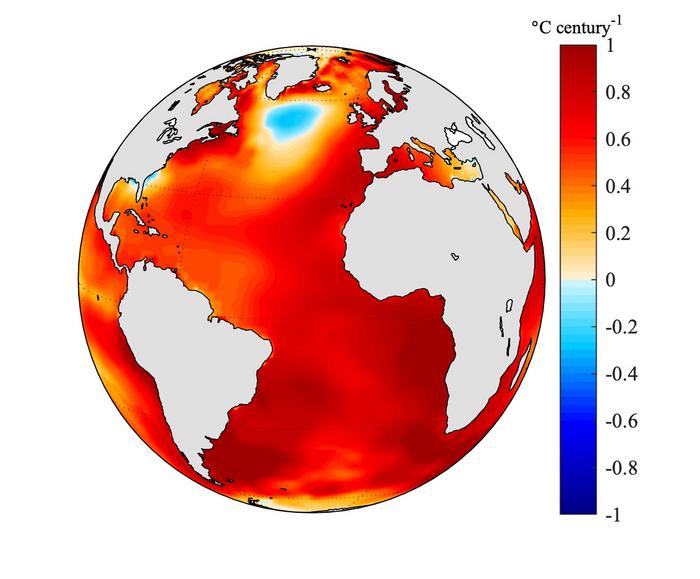Something’s stirring in the Atlantic Meridional Overturning Circulation (AMOC) – and a strange “hole” of cold water in the North Atlantic may provide new clues about what’s up. But is the system on the brink of full-blown collapse, or will it keep churning on despite mounting pressure?
The AMOC is “the conveyor belt of the ocean”, a sea-spanning system of currents that transports warm water from the tropics northwards into the North Atlantic.
It plays a key role in pushing heat and freshwater around the Atlantic via a network of deep and near-surface ocean currents. The system works by transferring warm and salty surface water from the tropics through the North Atlantic. When it approaches the North Pole, it cools and forms sea ice. The remaining water then sinks and is carried southwards in the depths below, completing the cycle.
By bringing warmer water towards the North Pole, it helps to bring warmer weather conditions in Northwest Europe and the North Atlantic. Without the AMOC, these parts of the Northern Hemisphere would be significantly chillier.
In recent years, scientists have suggested that the AMOC is weakening due to changes in water entering the system. The prime drivers of this, shifts in rainfall and Greenland Ice Sheet melt, are both associated with human-driven climate change.
It’s becoming increasingly evident that the slowdown of the AMOC may already be starting to impact our world. New research by the University of California, Riverside, has affirmed the theory that an unusual “hole” of cold water in the North Atlantic near Greenland is the result of the AMOC slowing down.

Atlantic sea surface temperature trend between 1900-2005 (color shading in °C) for the average of six observation datasets.
Image credit: Kai-Yuan Li/UCR
“People have been asking why this cold spot exists. We found the most likely answer is a weakening AMOC,” Wei Liu, a climate scientist who led the study with doctoral student Kai-Yuan Li, said in a statement.
These changes aren’t limited to the Northern Hemisphere either. Another study has found that the circulation slow down of the AMOC is causing an increase in rainfall in the Southern Amazon during the dry season.
By analyzing data from 1982 to 2022 with advanced methods, researchers found that for every 1 million cubic meters per second decrease in AMOC strength, dry season rainfall in the Southern Amazon increases by about 4.8 percent each year.
“The Amazon is still drying. The stabilizing interaction we found from the AMOC onto the Southern Amazon competes with other effects like those arising from deforestation and increasing temperatures, which would cause continued Amazon drying that the interaction will not be able to compensate for long-term,” Nico Wunderling, study co-author from Potsdam Institute for Climate Impact Research and the Center for Critical Computational Studies in Frankfurt, said in another statement.
“To accurately estimate future risks, we need to understand these complex interactions. Our study adds an important piece to this puzzle,” added Wunderling.
Previously, some researchers have suggested that the slowing down could catastrophically collapse the AMOC entirely, marking an irreversible tipping point of Earth’s natural systems. However, a third recent study suggests this is unlikely to be the case.
While the researchers acknowledge the AMOC is slowing down, their models of ocean circulation indicate that it’s unlikely to grind to a halt entirely. In fact, the weakening over the next few decades might not be as severe as once feared.
“Our results imply that, rather than a substantial decline, the AMOC is more likely to experience a limited decline over the 21st century – still some weakening, but less drastic than previous projections suggest,” Dave Bonan, study author and former graduate student at Caltech, said in a statement.
Bear in mind, though, that this study is just one of the many voices in the conversation; some scientists are optimistic that the AMOC is not doomed to collapse, while others believe we should be extremely worried about its future.
Either way, these findings underscore the urgency of deepening our understanding of the AMOC, not only to predict how it may evolve in the coming decades, but also to prepare for the far-reaching consequences its weakening could have on weather, ecosystems, and societies across the globe.
Source Link: The Atlantic's Major Circulation Current Is Showing Worrying Signs, But Is Collapse Near?